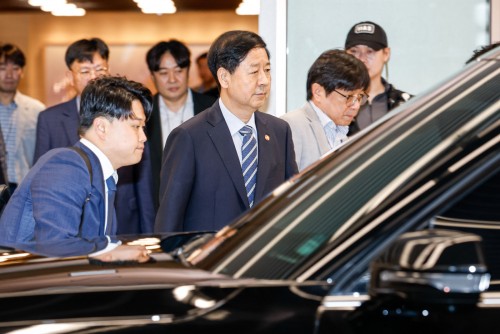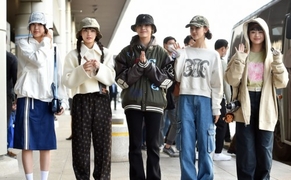 |
| Deputy Prime Minister and Finance Minister Koo Yoon-cheol leaves Incheon International Airport on July 24 after abruptly canceling his planned trip to the U.S. for “2+2” trade talks. / Source: Song Ui-joo, Yonhap News |
With just a week remaining before the U.S. enacts retaliatory tariffs, South Korea has entered emergency negotiation mode, exploring a $100 billion investment proposal in the U.S. to help defuse trade tensions.
On July 24, Deputy Prime Minister and Finance Minister Koo Yoon-cheol canceled his scheduled departure from Incheon International Airport for the anticipated “2+2” trade talks in Washington, underscoring the urgency of the situation. Meanwhile, National Security Advisor Wi Sung-lac returned from backchannel talks in Washington, raising expectations over potential outcomes.
The presidential office announced, “Korea and the U.S. are engaging in close discussions through various channels,” adding that Wi had “adequately conveyed the Korean government’s position” during meetings with U.S. officials. The Ministry of Economy and Finance also clarified that while the “2+2” meeting was abruptly delayed, the U.S. has proposed to reschedule it soon, and both sides are working to fix a new date as early as possible.
In a written briefing, the presidential office said Wi's visit to Washington was intended to “lay groundwork for sector-specific economic negotiations by conducting comprehensive talks on security and economic issues.” He met with officials including Secretary of State and National Security Advisor Marco Rubio (though only by phone), Deputy National Security Advisor Jennifer Baker, and Secretary of Commerce Rutnick.
In a key move, the Korean government is preparing a multi-pronged strategy involving both public and private sectors to reduce the proposed 25% U.S. tariff rate. Central to the effort is a plan to propose over $100 billion (approximately 137 trillion won) in local investment by Korean companies. President Lee Jae-myung met with Samsung Chairman Lee Jae-yong over dinner at the presidential residence in Yongsan to discuss boosting U.S.-bound investments. Similar meetings were previously held with Hyundai’s Chung Eui-sun and LG’s Koo Kwang-mo on July 14 and 15, respectively.
Timing remains critical. Countries including Japan, the U.K., Vietnam, Indonesia, and the Philippines have already concluded deals with the U.S., increasing pressure on Korea to finalize an agreement before the August 1 deadline. The last-minute cancellation of the “2+2” talks, originally slated for July 25, only adds to the urgency.
Domestic political considerations also complicate negotiations. Japan successfully lowered its tariff rate from the proposed 25% to 15%, setting a benchmark that Korean negotiators must now contend with. However, the scale of Korea’s proposed investment is also seen as a crucial bargaining chip. Japan, for instance, initially faced a U.S. demand for $400 billion in investment but ultimately pledged $550 billion (760 trillion won) during talks with President Donald Trump.
Most Read
-
1
-
2
-
3
-
4
-
5
-
6
-
7





















